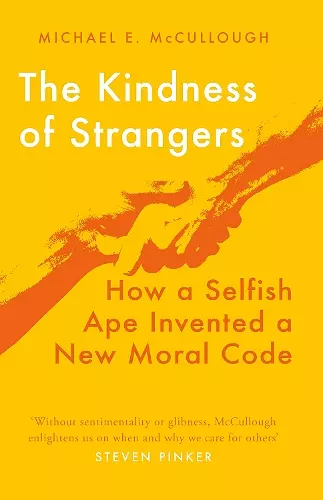The Kindness of Strangers
How a Selfish Ape Invented a New Moral Code
Format:Hardback
Publisher:Oneworld Publications
Published:3rd Sep '20
Should be back in stock very soon

Why do we give a damn about strangers?
Altruism is unique to the human species. It is also one of the great evolutionary puzzles, and we may be on the brink of solving it.
It turns out that, over the last 12,000 years, we have become more and more altruistic. This is despite the fact that, the majority of the time, our minds are still breathtakingly indifferent to the welfare of others.
In solving the enigma of generosity in a world of strangers, McCullough takes us on a sweeping history of society and science to warn that, if we are not careful, our instincts and sympathies have as much potential for harm as for good. The bad news is that we are not designed to be kind. The good news is that we can push ourselves to be kind anyway, together.
‘Exploring the journey from our xenophobic ancestors to the science and technology aiding our psychology today, this book is an intriguing read for anyone interested in our social evolution and the paths that defined us.’
* How it Works *‘An inspiring and engrossing new look at human goodness. Without sentimentality or glibness, and wearing his depth and erudition lightly, McCullough enlightens us on when and why we care for others.’
-- Steven Pinker, Johnstone Professor of Psychology, Harvard University, and the author of Enlightenment Now‘A deliciously provocative analysis of an entirely admirable human quality.’
* Kirkus (starred review) *'Enlightened by evocative anecdotes and well-explained theory, The Kindness of Strangers is as original as it is persuasive.'
-- Richard Wrangham, Ruth B. Moore Professor of Biological Anthropology at Harvard University and author of The Goodness Paradox'This fascinating and wide-ranging book presents a new theory of why we are kind to strangers. Michael E. McCullough argues that the standard answers are mistaken—our kindness is not the product of a special evolved system, nor is it a biological accident. Rather, while it is based on part on evolved social instincts, it mostly arises through the exercise of our capacity for reason. This is a controversial position, but McCullough’s arguments are smart, clear, and ultimately persuasive.'
-- Paul Bloom, Brooks and Suzanne Ragen Professor of Psychology, Yale University, and author of Against Empathy: The case for rational compasISBN: 9781786078186
Dimensions: 234mm x 153mm x 32mm
Weight: unknown
368 pages